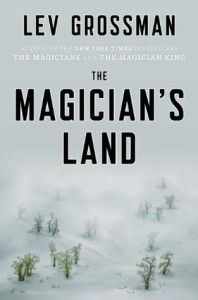“He’d been right about the world, but he was wrong about himself. The world was a desert, but he was a magician, and to be a magician was to be a secret spring – a moving oasis. He wasn’t desolate, and he wasn’t empty. He was full of emotion, full of feelings, bursting with them, and when it came down to it, that’s what being a magician was. They weren’t ordinary feelings – they weren’t the tame, domesticated kind. Magic was wild feelings, the kind that escaped out of you and into the world and changed things. There was a lot of skill to it, and a lot of learning, and a lot of work, but that was where the power began: the power to enchant the world.”
“This is a feeling that you had, Quentin, she said. Once, a very long time ago. A rare one. This is how you felt when you were eight years old, and you opened one of the Fillory books for the first time, and you felt awe and joy and hope and longing all at once. You felt them very strongly, Quentin. You dreamed of Fillory then, with a power and an innocence that not many people ever experience. That’s where all this began for you. You wanted the world to be better than it was.”
So . . . this series turned out to be kind of genius. I’m so, so glad I gave it another shot. I would have missed out on what turned out to be, frankly, a very moving reading experience there at the end. In fact, it’s like Grossman heard every single one of my complaints from five years ago and addressed them directly. Seeing as how that’s both extremely unlikely and pretty narcissistic, I’m thinking what actually happened is that he designed the story to be this way, only you had to be patient enough to see it all the way through. The books are definitely meant to be read together. None of the books make much emotional sense on their own, and that includes the first one. So if you were like me and gave up after that one, I would very much suggest giving it another go.
The Magician’s Land picks up after the last book. Quentin has been kicked out of Fillory, and he’s actually trying to make a go of it in the real world instead of moping around and feeling sorry for himself about how awful everything is. He ends up back at Brakebills for a while as a Professor, which is where he meets Plum, a thankfully very platonic acquaintance whose fate turns out to be tied up not only with his, but with Fillory’s. The plot cycles back and forth between flashbacks to the past six months, trips over to Fillory to check in with Janet and Eliot, and an actual for real crime caper that Quentin and Plum sign up for in the present day that involves stealing a very powerful magical object on behalf of a mysterious benefactor. All the while, it turns out that Fillory has reached the end of its lifespan. Fillory is dying.
It was so much fun watching all of the plot threads from the last two books come together. It was also ridiculously emotionally satisfying. And Grossman is one of those tricksy writers who can also make stories work on multiple levels. You just know he wants you to analyze the shit out of this book. You don’t have to, but you can if you want to. It probably also helps that the Narnia books make up a significant portion of my literary childhood, and in many ways these books are Grossman’s way of processing his own adult emotions about fantasy stories, and the Narnia books in particular. For me, though, this series turned out to be about what it’s like to become an adult, to realize that the best way to live in this world is to try and make it more like you wish it was, like you know it could be. Like Quentin does with magic, Grossman creates worlds with his emotions, with flicks of his fingers, and I’m so glad that he does.
[4.5 stars]

